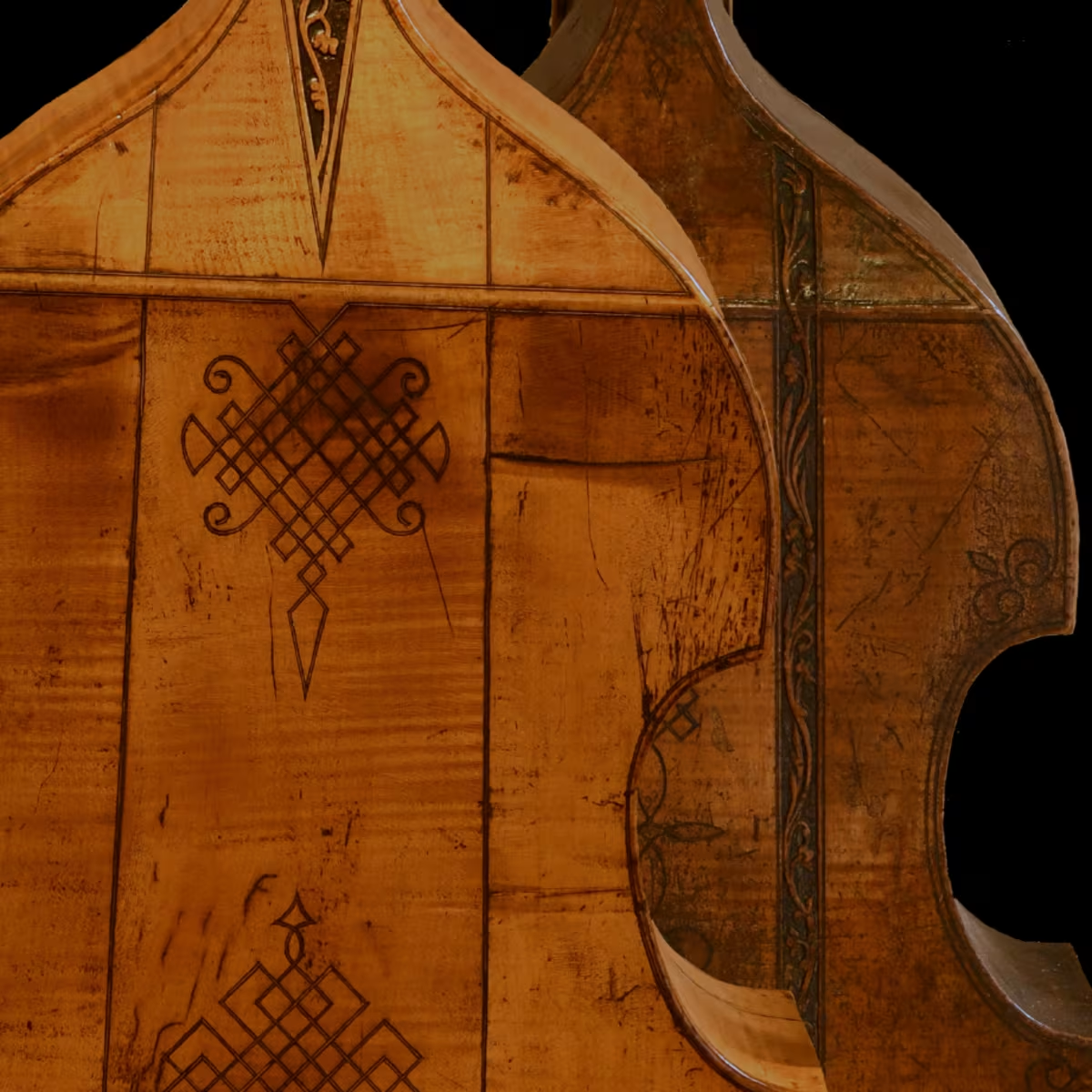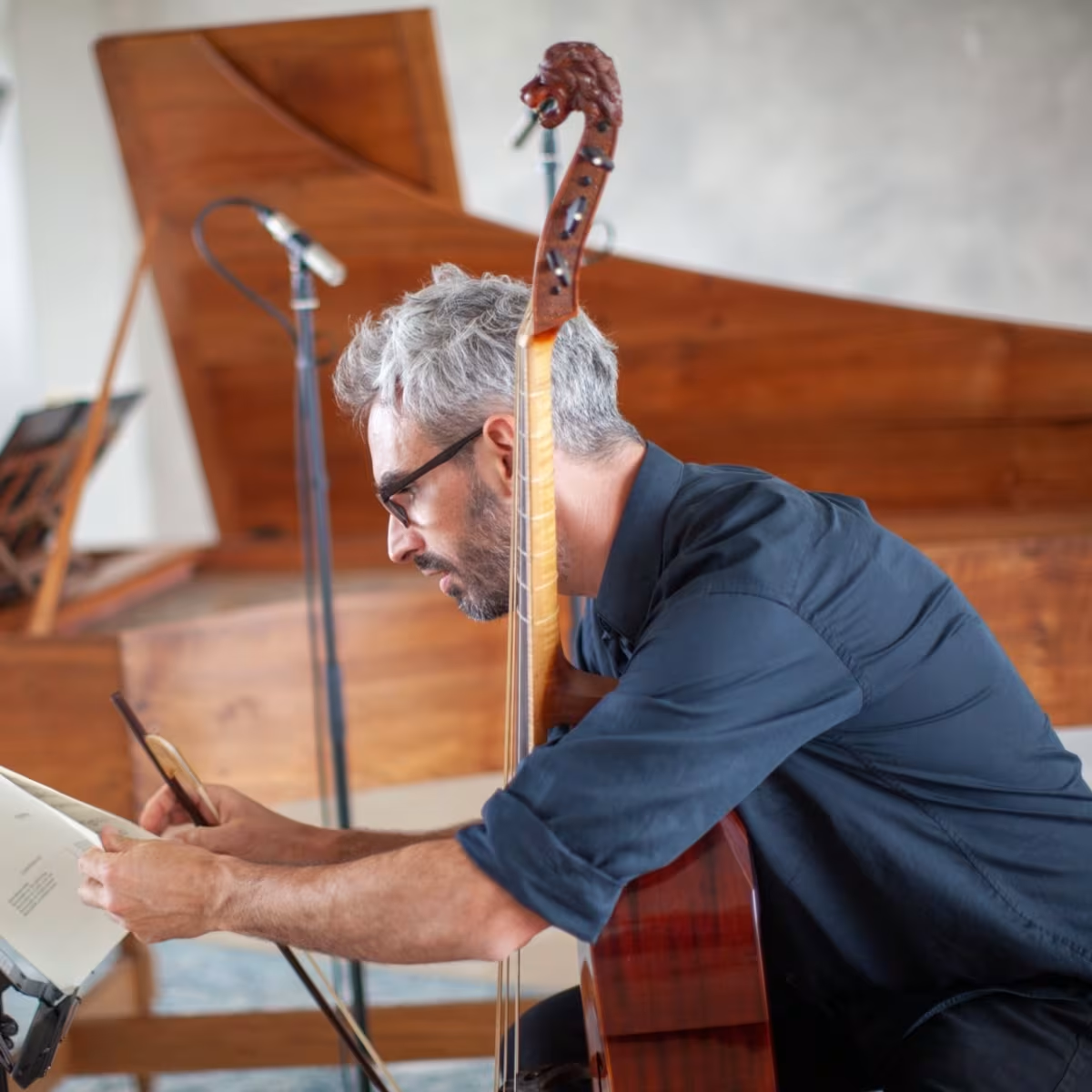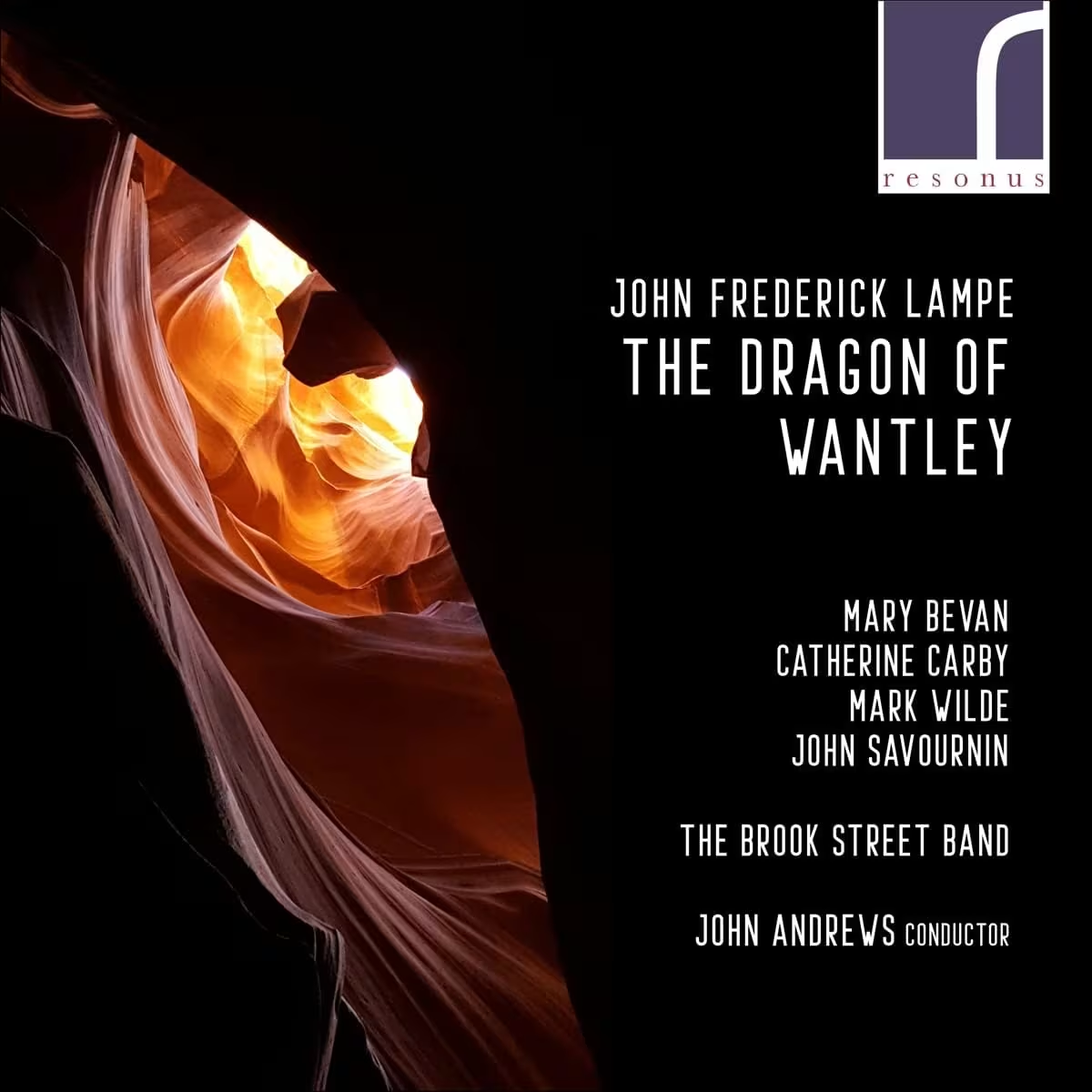Essay
The story of the love:Handel festival
Share this

The brilliantly-named love:Handel festival is the creation of Tatty Theo, founder of the Brook Street Band. Continuo Connect met up with Tatty to find out more about what inspired her to start the festival, and the ups and downs of organising what has become a fixture in the early music calendar.
Tatty grew up in the world of music festivals, both performing and attending, and had always wanted to start her own. Talking to friends and colleagues she was warned - “don’t! It’ll be hard work!” but she was undaunted, and in any case no stranger to hard work. The Brook Street Band was approaching its 20th birthday, and as a group they collectively decided to dip their toe in by setting up a mini festival. The idea would be simple - play all their favourite Handel in a single day. Well known for squeezing as much as possible into a programme, Tatty’s single day turned out to be two days, a whole weekend, and in 2017 love:Handel was born. She recollects that the name initially shocked their trustees, but she persuaded them that it was “a cool name”, and it proved to be exactly that.
The festival, which takes place in Norwich, was coupled with education projects from the start. Tatty and Brook Street work a lot in East Anglia and they are extremely keen to introduce music to the next generation - and early music is the key, she says:
“If you want to get kids into music, Baroque is perfect! Easy to listen to, and they’ll have heard so much in real life, as it happens, from gaming, to pop songs, and it’s hard to be scared of a bit of Vivaldi!”
Brook Street Band takes workshops, performances, and even harpsichords into schools, and they collaborate with Cambridgeshire Music on a youth baroque orchestra in Cambridge. Tatty highlights how they want to “get them into playing with stylistic verve” as well as listening to Baroque music - from ornamentation to phrasing. She might start with a simple chaconne (think of improvising over a simple bassline - a famous chaconne or canon being Pachelbel’s!), and encourage the young musicians to try variations and divisions over the chord structure, to enter fully into the Baroque sound-world.
When Tatty was a teenager, she settled rapidly on the Baroque cello in particular, and recalls that people were horrified - telling her to “learn the great works first!” - but for Tatty, and of course for Continuo Connect, the great works are naturally to be found in early music… Her projects have inspired numerous young musicians, several of whom have followed in her path. Fretwork’s Sam Stadlen, for example, came on one of Brook Street Band's courses while he was still at school; he told Tatty years later that this was one of the inspirations for his subsequent career. Similarly, Baroque violinist Rebecca Harris, who now performs extensively with UK and American early music groups including Tempesta di Mare, Piffaro, and the Washington Bach Consort, is another alumna of these courses.
It’s not just the cream of the current generation of Baroque musicians - the influence of the festival and workshops is already being felt by the children who will be the audiences and musicians of the future - here are just a few of many comments gathered by Tatty from pupils in year 6 (ages 10-11) after recent school visits:
“I really liked the special type of music that you played. It was unique and I enjoyed it a lot. I also really enjoyed how you explained about the different instruments.”
“I really enjoyed it. I would absolutely love if you come again.”
“I liked how you spent time talking about your instruments and the people who first created them. The Brook Street Band were very good at what they do and I think they should play in front of more schools.”
Tatty especially loves these comments from children: “that’s when you find out you’re having an impact, that you give them a means to express themselves, something they thought wasn’t for them and it turns out they really love it, and want to do more.”
Returning to the love:Handel festival itself, after the success of 2017, the Brook Street Band decided to do it all over again in 2019. This time it was three days, once again accompanied by projects in schools, and in every respect it built on the previous edition, and looked set to become an institution. However, 2020 was - to put it mildly - a bad year for live music, thanks to the pandemic. Tatty says she was incredibly thankful that she had not planned a festival for that year, but it nonetheless had knock-on consequences for their projects and planning.
The festival returned in 2021, albeit back to a two-day festival, with post-pandemic difficulties in fundraising and ongoing concerns and lingering rules around attendance at music venues.
Now that such times are fortunately behind us, love:Handel returned for a bumper-size festival in 2023, encompassing three historic Norwich venues: the Octagon Chapel (a beautiful 18th century wooden chapel), the Music Room at the 1760 Assembly House, plus The Chapel, Park Lane. Each venue attracts a different audience, and attracting new audiences is a key part of Tatty’s aims:
“Although the music is “old” we aren’t “old-fashioned”. We want to show people that although we’re dealing with a long-gone period - Handel died 1759 - it’s still relevant. We as people haven’t changed that much! Handel came as an immigrant to England; English was his fourth language - he was self-made, and had to raise his own funds without royal patronage, and he made and lost a fortune and made it again. I like to present a backstory to show a parallel between an audience member’s life today and that of someone back in the 18th century. Suddenly the centuries aren’t far apart - we’re in modern clothes with a computer, and some things have changed for the better, like plumbing! But plenty more is the same. The feelings you have about other humans - and your hopes, dreams, worries, fears - they are all the same!”
The Brook Street Band frequently performs in Norwich, apart from the festival. In particular, there’s an annual Christmas concert which attracts a substantial and very loyal audience, but not wanting to assume they’ll come to everything the band puts on, Tatty is always keen to attract broader interest. For example, noticing that they didn’t have many kids and families in their audiences despite offering free tickets for young people, they’ve pioneered funding (from Norwich Freemen’s Charity) to provide free tickets for parents of the under 18s. As public transport can be difficult or unreliable, it’s often necessary to drive to evening concerts, and Tatty realised that even if young people wanted to come, they needed their parents - their chauffeurs! - to come along too, free of charge thanks to the new funding.

Their concerts are relaxed and informal, quite short at around an hour in duration, and the Band always chat with the audience. Tatty is keen that classical music shouldn’t be “boring and stuffy”, and the Brook Street Band want to make it feel totally accessible. While relaxed, the Band still dress up - not in formal dress, but not in jeans and T-shirts either, and definitely not in period costume. Tatty recalls a previous engagement with a shudder:
“You’d have to pay me a huge amount to play in an 18th century outfit again! I did it at Hampton Court as a historical interpreter for several years, playing music all day long dressed up in an incredible authentically-made 18th century costume. It took forever to go to the loo! Corsets and everything!”
Returning to the subject of fundraising - key to the success of any festival - Tatty recounts that it’s something she’s had to “get good at”. While the Band has a board of hardworking and supportive trustees, it’s largely left to Tatty as the organisational linch-pin to lead fundraising. It’s something that takes a huge amount of her time - and, she says, as every grant applicant knows, it’s very stressful when you’re waiting to hear back:
“Festivals and classical music itself wouldn’t be possible without patrons, supporters, and funding charities such as Continuo Foundation. Otherwise, you’d have to make your tickets incredibly expensive to cover costs, but you want to give free tickets away to people who need them to attract new audiences. Handel was himself very enterprising! These days we have in some ways returned to 18th century models where you need a benefactor or patron.”
Tatty recalls that such concerns were very different in the early 20th century. Her grandfather William Pleeth was a notable cellist and a key influence on her own development as a cellist, playing duets with him every Saturday. Several years ago, she received funding from the Finzi Foundation to research his early life in Leipzig. She has started writing a book about her findings, which shed a contrasting light on the way musicians are funded today. Her grandfather had always said it was eminently possible to make a respectable living as a chamber musician even just working for the BBC, and Tatty’s research in the BBC archives revealed just how true that was. Money was ploughed into the arts - and good instruments, for example, were affordable to working musicians. During his long career Pleeth was able to buy two Stradivarius cellos on his modest income, which would be an impossible dream today, with such instruments seen as investment objects. Fortunately, the foundations that own and invest in these instruments often loan them to musicians.

William Pleeth used to talk about his experiences during WWII with Tatty - he would have been in his mid 20s at the time. Everyone he knew who was eligible eagerly responded to being called up to serve, and he ended up working in catering. However, his CO was a music enthusiast and noted the new recruit’s ability, and soon Pleeth was put to work playing rather than cooking. And so, his War experience comprised six years of chamber music, playing trios with pianist Edmund Rubbra and violinist Joshua Glazier. They were sent all over England, Scotland, and later Germany as the “Army Classical Music Group” for the Entertainments National Services Association and the Council for the Encouragement of Music and the Arts, tasked with boosting morale among troops, factory workers, and others on the “home front”, and travelling with their own grand piano.

For Tatty, it’s an incredible juxtaposition that she relives through researching Pleeth - he was Jewish, with family originally from Warsaw and Łodz in Poland, but despite everything it was an amazingly fertile creative period. After the War, there followed the Festival of Britain, the founding of the Royal Festival Hall, and classical music (featuring a certain W. Pleeth!) forming a central role in the BBC’s output. It’s the contrast of those times and ours which motivates Tatty to bring her projects to schools - priorities might have changed at a national level, but she can still inspire the next generation.
Tatty is an obsessive planner when it comes to organising the love:Handel festivals; she says the Band laugh at her for fearing the worst, but she always plans for it. Not just plan B, but C, D, and E too, and she’s always asking “what if…?” She always has spare music, and even spare lights - and in both cases there have been occasions where that has saved the day.
Even with the most fastidious planning, circumstances when on tour can often be basic, to say the least - just for Continuo Connect, Tatty recounts several venues that didn’t have either lights or loos - and she didn’t want that for the festival. Even the now-ubiquitous hand-gel poses a deadly threat to ancient instruments and, therefore, must be planned for and taken into account.
There are more creative problems met when mounting a festival than planning for the audience (and performers’) convenience. After the first festival, Tatty had programmed “every piece of Handel chamber music she knew”, so for the second and subsequent festivals, the challenge was to do something different, to show Handel’s music in a new light. Since 2019, therefore, each love:Handel festival has a theme, and speakers and other partners are invited to take part - it’s more than music now.
In 2019 the theme was great love stories in music (in particular Acis and Galatea), and the stories instruments can tell us - they had an instrument appraiser on hand to reveal instruments’ histories, similar perhaps to the Antiques Roadshow!
Post-lockdown in 2021 the theme was built around cities they’d wanted to visit but couldn’t - “armchair travel” with the music bringing far-off places to life. The theme was developed in 2023 with the addition of time travel - Travels in Time and Place - and the festival featured a new work by composer Nitin Sawhney merging influences from East and West. This collaboration came out of work that Tatty had done with LIFEM (London International Festival of Early Music), who commissioned Sawhney to work with Theo. He listened to everything she sent him and developed a theme around the “deep night”, drawing inspiration from Handel’s As Steals The Morn Upon the Night and Indian ragas associated with night-time. The work was presented in an atmospheric, dramatic programme linked by spoken texts, with no applause between items (and no pauses for tuning - a risk with sensitive gut strings!). The third performance of Sawhney’s “as steals the morn upon the night” took place in the 2023 love:Handel festival.

Tatty isn’t letting on to Continuo Connect what the theme in 2025 might be, but we are confident that love:Handel 2025 (and beyond) will be as exciting, revelatory, and inspiring as the previous editions. We’re also confident that should we be caught short at one of the concerts, we’ll be well looked after!
Share this
Keep reading

Old Spelling But Fresh Explorations
Newe Vialles explores the evolution of the viol, blending historic instruments with fresh interpretations in both recordings and live performances.

In conversation: Jan Zahourek
Continuo Connect meets freelance double bass, viola da gamba and violone player Jan Zahourek who enjoys a variety of collaborations.

John Frederick Lampe: The Dragon of Wantley
John Frederick Lampe: The Dragon of Wantley - an award-winning recording from The Brook Street Band and conductor John Andrews.

